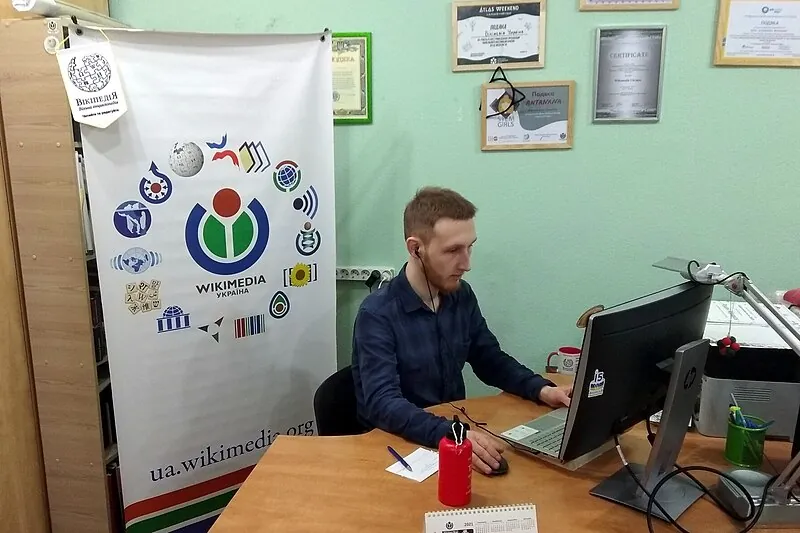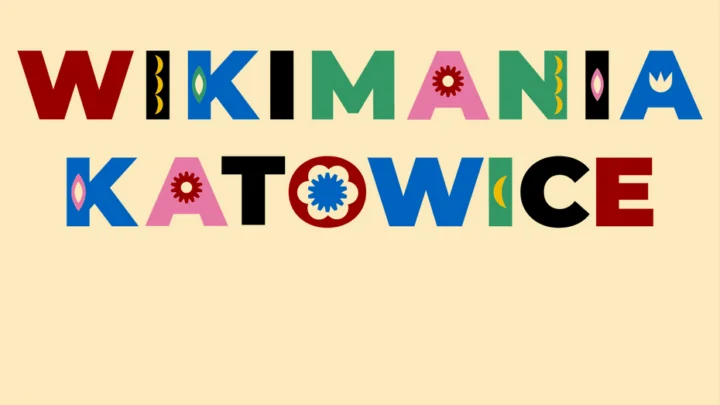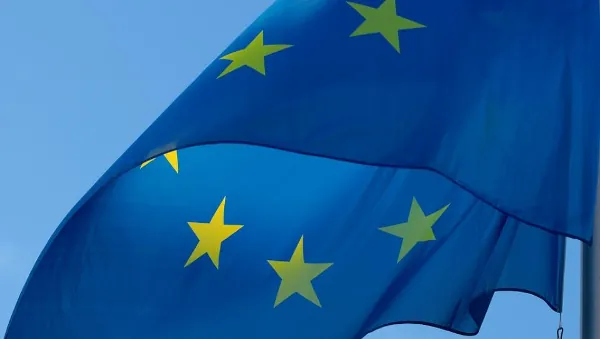Wikimedia & Wikipedia in Ukraine
Defying the war with Wikipedia – The commitment to Free Knowledge in Ukraine

Patrick Wildermann
19. February 2025
There is no question of getting used to it. Three years after the start of the Russian war of aggression in Ukraine, the capital Kyiv in particular has returned to normality in some respects. “But we are experiencing growing fatigue and exhaustion in society as a whole,” says Anton Protsiuk, Program Coordinator of Wikimedia Ukraine (WMUA), with whom Wikimedia Deutschland has been in constant contact since 2022. “Just this morning, the authorities announced another temporary blackout because there were Russian attacks during the night,” says Protsiuk. “Fortunately, this time the blackout only lasted a short four or five hours.”
Honors at the Wikiconference

In the video call, he talks about the challenges that the Ukrainian Wikimedia chapter and the community are still facing – including economic difficulties, the constant stress and the fact that many volunteers have signed up for military service or been drafted. But Protsikuk also reports on how the commitment to Free Knowledge continues successfully even under the conditions of war. Despite everything, there are also positive things to report from WMUA’s perspective.
For example, the annual Wikiconference – which took place in 2024 as a three-part event in Kyiv, Kharkiv and online – was attended by over 120 people, “more than ever before”, says the program coordinator. At the station in Kyiv, prizes were also awarded to 38 particularly deserving Wikipedians to mark the 20th anniversary of Ukrainian Wikipedia, which Protsiuk reported on in a blog. In addition, the number of volunteers and members of WMUA has recently increased. However, Protsiuk points out: “We could get many more people involved in Wikimedia projects if our country had not been affected by the Russian attack.”
The community remains active
Wikipedian Kate Kifa is one of the volunteers who, despite the difficult situation, is admirably versatile in her commitment. Originally from Odessa, she now lives in a city near Kyiv, where there are fewer attacks and fiber optic internet that works even during power outages. She has been writing with her own account on the Ukrainian Wikipedia since 2021, focusing on women-related topics because it is important to her to reduce the gender gap in the online encyclopaedia: “I am interested in personalities such as female scientists, writers and journalists,” says Kate Kifa, who also cites feminist community projects such as WikiWomen and WomenInRed as inspiration.
Her broad range of topics also includes music, films, technology and African cultures: “I was a fellow in a UNESCO program a few years ago and still have many friends in various African countries from that time,” says the Wikipedian, who also translates articles from various language versions of Wikipedia into Ukrainian, such as French, Spanish and Italian. At the recent Wikimania in Katowice, Poland, she was part of the translation team and “wrote daily ‘Diff’ articles and email newsletters in Ukrainian.”

The therapeutic effect of editing
When asked where she gets the energy for all these activities in times of war, the Wikipedian gives a differentiated answer: “The situation we find ourselves in causes stress, anxiety, sleep disorders, increased tension, burnout and emotional fluctuations that are sometimes not noticeable because the human body is simply trying to survive,” she describes. Accordingly, she focuses on activities and routines “that promote my physical and mental health”. Like yoga, drinking water, walking outside, meditation, less coffee, remembering the need for rest.
And last but not least: edit Wikipedia. Because that, says Kate Kifa, “really has a therapeutic effect.” Contributing to the Wikimedia projects is both “a grounding anti-stress activity” and an opportunity to gain a sense of control and efficacy: “It builds self-confidence when you can share your knowledge. You write an article that can be read instantly around the world, in Australia, in Zimbabwe – and you’re contributing to cultural preservation and education at the same time. I particularly appreciate that in these difficult times.”
The Wikimedia projects as a source of opportunities
The coexistence of normality and a state of emergency continues to define the work of WMUA and the community. Anton Protsiuk talks about an upcoming webinar on the use of AI in the Wikimedia projects, for which 150 people have already registered, as naturally as he talks about drone attacks on civilian infrastructure. However, both Protsiuk and Kate Kifa blossom in conversation when it comes to the projects, which are taking place in large numbers despite the war – over 100 in 2024.

“Wikimedia Ukraine is an amazing source of opportunities right now,” enthuses Kate Kifa. “Every few weeks there are activities such as competitions and marathons on various topics. This February, for example, we’re having a Germany month, where the aim is to get as many articles about German politics and culture into the Ukrainian Wikipedia as possible. I myself am involved in initiatives such as WikiGap, 1Lib1Ref and (Un)known Women of Wikipedia, where I’m now part of the organizing committee.”
Just a few days ago, she also took part in a Wikisource competition and proofread a text by the Ukrainian writer Volodymyr Vynnychenko, who was part of the generation of Ukrainian artists who were banned by the Soviet regime throughout the 20th century and rediscovered in modern Ukraine.
Preserving cultural heritage during the war
Making knowledge about Ukraine accessible, preserving the country’s cultural heritage and making it visible – “that is currently the most important thing for us,” says Anton Protsiuk. “Anyone who contributes to Wikipedia with Ukrainian topics helps us just as much as someone who donates money to our organization.” The photo competitions Wiki Loves Earth (which was invented in Ukraine) and Wiki Loves Monuments also play a major role in preserving cultural heritage.
Both competitions recently had special categories relating to the effects of Russian aggression; WLM was specifically about monuments that were destroyed during the war. “In 2024, we had the second highest number of photo submissions worldwide with the Ukrainian edition of WLM,” says Protsiuk. In terms of popularity in the community, the competition also took the top spot among the five largest WMUA projects last year.


A hopeful look into an uncertain future
Kate Kifa says that she promotes her involvement in the wiki projects to friends and family members as well as on social media. She is optimistic about the development of the community: “I see more and more young and older people joining the wiki movement. Some of them are under 16 years old, others 55+ and very active in taking on more leadership roles. The Wikimedia Ukraine team is super supportive and also helps to organize an event or a marathon on a topic you are interested in.”
During the conversation, Anton Protsiuk repeatedly returns to a point that is of central importance to him: “The future of our organization and the community is inextricably linked to the future of Ukraine.” At the moment, the mood in the country is difficult to describe, “there is mainly uncertainty,” he says. “As the WMUA, we have a strategic plan for the next two years. But to be honest: We don’t know what will happen.”


